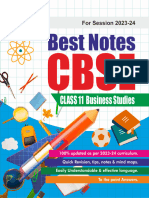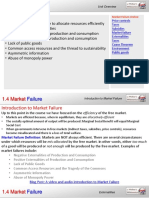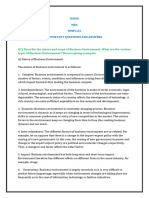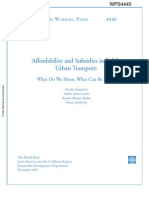0 ratings0% found this document useful (0 votes)
161 viewsMarket Faliure: Presenter: Topic: Key Message
Market Faliure: Presenter: Topic: Key Message
Uploaded by
delimaMarket failures occur when free market forces fail to allocate resources efficiently. Some key causes of market failure include externalities, where production or consumption imposes costs or benefits on third parties; merit and demerit goods, which are under- or over-consumed due to imperfect information; and abuse of monopoly power, where firms exploit consumers by charging high prices without competitive pressure. Government intervention, through taxes, subsidies and regulation, aims to correct for these market failures and achieve more efficient outcomes.
Copyright:
© All Rights Reserved
Available Formats
Download as DOCX, PDF, TXT or read online from Scribd
Market Faliure: Presenter: Topic: Key Message
Market Faliure: Presenter: Topic: Key Message
Uploaded by
delima0 ratings0% found this document useful (0 votes)
161 views8 pagesMarket failures occur when free market forces fail to allocate resources efficiently. Some key causes of market failure include externalities, where production or consumption imposes costs or benefits on third parties; merit and demerit goods, which are under- or over-consumed due to imperfect information; and abuse of monopoly power, where firms exploit consumers by charging high prices without competitive pressure. Government intervention, through taxes, subsidies and regulation, aims to correct for these market failures and achieve more efficient outcomes.
Original Description:
Market Failure-IGCSE/GCSE
Economics notes
Original Title
Market Failure(economics)
Copyright
© © All Rights Reserved
Available Formats
DOCX, PDF, TXT or read online from Scribd
Share this document
Did you find this document useful?
Is this content inappropriate?
Market failures occur when free market forces fail to allocate resources efficiently. Some key causes of market failure include externalities, where production or consumption imposes costs or benefits on third parties; merit and demerit goods, which are under- or over-consumed due to imperfect information; and abuse of monopoly power, where firms exploit consumers by charging high prices without competitive pressure. Government intervention, through taxes, subsidies and regulation, aims to correct for these market failures and achieve more efficient outcomes.
Copyright:
© All Rights Reserved
Available Formats
Download as DOCX, PDF, TXT or read online from Scribd
Download as docx, pdf, or txt
0 ratings0% found this document useful (0 votes)
161 views8 pagesMarket Faliure: Presenter: Topic: Key Message
Market Faliure: Presenter: Topic: Key Message
Uploaded by
delimaMarket failures occur when free market forces fail to allocate resources efficiently. Some key causes of market failure include externalities, where production or consumption imposes costs or benefits on third parties; merit and demerit goods, which are under- or over-consumed due to imperfect information; and abuse of monopoly power, where firms exploit consumers by charging high prices without competitive pressure. Government intervention, through taxes, subsidies and regulation, aims to correct for these market failures and achieve more efficient outcomes.
Copyright:
© All Rights Reserved
Available Formats
Download as DOCX, PDF, TXT or read online from Scribd
Download as docx, pdf, or txt
You are on page 1of 8
MARKET FALIURE
As your classmate (or a group) presents, take your notes here:
Presenter:
Topic: MARKET FAILURE
Key Message: Efficiency
(summarize the key
Exploitation
message or theme of
the presentation) Under/Overproduction
Information Failure
Abuse of Monopoly power
Immobility of Resourcse
Short -termism
Market failure occurs when the market force fails to
produce products that consumers demanded, in the
right quantities.
Indicators of market failures:
-shortage
-surplus
-high price/poor quality
-lack of innovation
Price may be high due to competitive pressure.
The lack of investment in expenditure and research
can slow down the improvement of a product
Overproduction and overconsumption of goods or
services which cause negative externalities on a third
party
Underproduction and underconsumption of goods
or services which cause positive externalities on a
third party
Failure of the private sector to provide public goods
due to lack of a profit motive
The existence of a monopoly that charges high
prices and exploits customers
1st point: EXTERNALITY
hna
Third holder impact (not the shareholders) the
consumption and production of some products may
affect people who are not involved directly to the
consumption and production.
In such cases the total benefits and total cost to
the society called social benefits and social
benefits are greater than the benefits and cost to
the consumer ad producers.
This is known as Private benefits and private costs
Cost to a third party is called external cost
Can be positive or negative
Not directly related to the firm and not consumers
Small scale business-infrastructure development,
electricity-helps other people
CBA-cost benefit analysis
Private cost +External cost =Social benefit
Maximum benefit to the society -socially optimal
level of output-the level of output where social cost
equals social benefit and society welfare is
maximized
2 graphs -overproduction
-underproduction
Demand based just of private benefits to those
consuming the product will lead to under
consumption and hence under production if the
total benefit to the society is greater.
2nd point: MERIT GOODS
(summarize the 2nd
point) Product which the government consider
consumers don’t fully appreciate on how
beneficial it is to them-so hence the product will
be under consumed if left to the market force
2 graphs -underconsumption of merit goods
-effect of subsidy
Direct provision & Subsidy
When there is underconsumption government
will give a subsidy so supply will increase.
Government will provide information on the
benefit of consuming the product. -this should
help increase demand for the product
If government thinks the product is undervalued
or there are considerable external benefits -it may
be provided for free to consumers
3rd point: DEMERIT GOODS
(summarize the 3rd
point) Are more harmful to consumers and generate
external cost
Generally overconsumed hence overproduced
To government tackles this problem by raising the
price and imposing tax
Helps discourage consumption-by providing
information on harmful effects
Bans on products -this can lead to black markets
Welfare loss
Such goods generate negative externalities
PUBLIC AND PRIVATE GOOD
Public Good
The degree of market failure is greater in public
goods
If left to the market force no good will be made.
If public good are provided for some people
others can consume them without paying
Those who take advantage of this are called Free
Riders
Non-Excludability
Non-Rivalry -the consumption from one
consumer will not reduce other consumers ability
to use the product
They are non-rejectable -not possible to reject
the service
The cost of supplying a public good to one more
consumer is often zero.
Financed through taxation
Private Goods
Merit and demerit goods are private goods
These products are rival and excludable
In these case-we can stop non payer from
enjoying the products-if one consumer consumes
the product the other consumers can’t
Markets will provide private good, not necessarily
in the right quantities
Excludability- a good or service is
called excludable if it is possible to prevent
people who have not paid for it from having
access to it.
Rivalry
Quasi-public good-have the characteristics of
both public and private good, including partial
excludability and partial rivalry
Such as -Roads
ABUSE OF MONOPOLY POWER
Market failure can arise due to producers having
more market power than consumers.
If one firm dominates the market -it may not be
allocatively productive or dynamically efficient
It will lack competitive pressure to respond to
consumer demand.
If it’s the only firm selling the product then it’s a
monopoly-consumers have no choice but to buy
form that firm
Abuse of market failure -occur when more than
one firm produces the product -they do price
fixing
Government may make price fixing illegal
They may stop firms from merging together -if
they merge they may go against consumer
interest-high price low quality
Oligopoly-a hand full of producers that share the
same markets;
Price fixing - a practice whereby rival companies
come to an illicit agreement not to sell goods or
services below a certain price.
IMMOBILITY OF RESOURCES;LABOUR
Occupationally
Geographically
Government prevents this market failure by
reducing prices of houses
SHORT -TERMISM
A risk that market forces may not result in
sufficient resources being devoted to capital
good
Questions Demerit goods are goods or services which,
(include any questions
when consumed, cause negative spillover effects
you have remaining
after the presentation) in an economy (e.g. cigarette smoking, alcohol
and gambling). Demerit goods are over-
consumed due to imperfect consumer
information about such goods.
Merit goods are goods or services which, when
consumed, create positive spillover effects in an
economy (e.g. education, training and health
care). Merit goods are under-consumed so
government intervention is often needed .
Free riders are people who take advantage of the
goods or services provided by the government
but have not contributed to government revenue
through taxation.
Market failure occurs when the market forces of
demand and supply fail to allocate resources
efficiently and cause external costs or external
benefits.
Private Benefit/Cost: benefits/cost the business
or consumer receives from producing/consuming
the good
External Benefit/Cost:
advantages/disadvantages society receives due to
us of a certain good/service
Externalities (or spill over effects) occur where
the actions of firms and individuals have either a
positive or negative effect on third parties.
External benefits are the positive side-effects of
production or consumption incurred by third
parties, for which no money is paid by the
beneficiary.
External costs are the negative side-effects of
production or consumption incurred by third
parties, for which no compensation is paid.
A subsidy is a sum of money given by the
government to a producer to reduce the costs of
production or to a consumer to reduce the price
of consumption.
You might also like
- Econ IADocument7 pagesEcon IAJason TantonoNo ratings yet
- Introduction To Market FailureDocument3 pagesIntroduction To Market FailureJennifer Baquial Comia100% (1)
- Introductory Economics (Micro and Macro) For Class... - (Part A Introductory Microeconomics)Document88 pagesIntroductory Economics (Micro and Macro) For Class... - (Part A Introductory Microeconomics)Kudakwashe RuzvidzoNo ratings yet
- Basic Mathematics For Economics AnalysisDocument211 pagesBasic Mathematics For Economics AnalysisSanskar ThakurNo ratings yet
- CH 4 (Economic Reforms Since 1991)Document13 pagesCH 4 (Economic Reforms Since 1991)ranjeetkumar196724No ratings yet
- NSSCO Economics SyllabusDocument28 pagesNSSCO Economics SyllabusKatjiuapengaNo ratings yet
- Ch1. Introduction To Economics (AK) 2023-24Document16 pagesCh1. Introduction To Economics (AK) 2023-24Aarav GroverNo ratings yet
- 12 - Chapter 16 Employment and UnemploymentDocument7 pages12 - Chapter 16 Employment and Unemploymentvishal kumarNo ratings yet
- Unit 3 - Policy Regimes (Part 1)Document57 pagesUnit 3 - Policy Regimes (Part 1)Sagar DasNo ratings yet
- 1micro Economics (Page 1 68) Book 1Document70 pages1micro Economics (Page 1 68) Book 1V.No ratings yet
- 11th Commerce Questiona PaperDocument1 page11th Commerce Questiona Paperrupeshdahake8586No ratings yet
- Bba 1st YearDocument85 pagesBba 1st YearRitik100% (1)
- PUBLIC POLICY AND ANALYSIS (IGNOU) Unit-20Document14 pagesPUBLIC POLICY AND ANALYSIS (IGNOU) Unit-20Vaishnavi SuthraiNo ratings yet
- Cbse Class 11 Economics Sample Paper Set 1 QuestionsDocument5 pagesCbse Class 11 Economics Sample Paper Set 1 QuestionsAman SawNo ratings yet
- Nature & Significance of ManagementDocument19 pagesNature & Significance of ManagementJoshua StarkNo ratings yet
- National IncomeDocument13 pagesNational IncomeEashwar ReddyNo ratings yet
- Difference Between Developed Countries and Developing Countries (With Comparison Chart) - Key DifferencesDocument1 pageDifference Between Developed Countries and Developing Countries (With Comparison Chart) - Key DifferencesHeather ClarchickNo ratings yet
- Micro CH-5 Production Function123Document16 pagesMicro CH-5 Production Function123LalitKukrejaNo ratings yet
- Scatter Diagram - Merits and Demerits - Correlation Analysis PDFDocument3 pagesScatter Diagram - Merits and Demerits - Correlation Analysis PDFAsif gillNo ratings yet
- All Chap Q&aDocument217 pagesAll Chap Q&aAkshat TiwariNo ratings yet
- Economics Notes PDFDocument15 pagesEconomics Notes PDFEstherNo ratings yet
- Human Capital FormationDocument16 pagesHuman Capital FormationxhaviNo ratings yet
- Public Sector in IndiaDocument10 pagesPublic Sector in IndiaVISHAL MEHTANo ratings yet
- CBSE Supporting Material Economics Class 12 2013Document152 pagesCBSE Supporting Material Economics Class 12 2013ChandraMENo ratings yet
- BEM - Introduction of EconomicsDocument23 pagesBEM - Introduction of EconomicsManami DasNo ratings yet
- Study Material Xii Indian Economic Development 2022-23Document158 pagesStudy Material Xii Indian Economic Development 2022-23gautamsh098No ratings yet
- Isc Commerce 12 Business Environment Mcqs With Solved Answers (Question 1 To 5)Document6 pagesIsc Commerce 12 Business Environment Mcqs With Solved Answers (Question 1 To 5)Neeraj RawatNo ratings yet
- BBS Macroeconomics 2nd YearDocument3 pagesBBS Macroeconomics 2nd YearIsmith Pokhrel50% (2)
- 1-The Nature and Scope of EconomicsDocument28 pages1-The Nature and Scope of EconomicsHassan AliNo ratings yet
- Balance of PaymentsDocument34 pagesBalance of PaymentsRavi Sista100% (1)
- Macro Economics NotesDocument31 pagesMacro Economics NotesSonali_2503No ratings yet
- Forms of Market: Prepared By: Reena D Isaac Mulund College of CommerceDocument23 pagesForms of Market: Prepared By: Reena D Isaac Mulund College of CommerceTejas Patil100% (2)
- Class 11 Business Studies 2023-24 Notes Chapter 9 - Small Business and EntrepreneurshiDocument40 pagesClass 11 Business Studies 2023-24 Notes Chapter 9 - Small Business and Entrepreneurshisourabhsoni5890No ratings yet
- Digital Empowerment NotesDocument6 pagesDigital Empowerment NotesPrerna yadavNo ratings yet
- MBS I Sem Ch-1Document55 pagesMBS I Sem Ch-1bijay adhikari100% (2)
- E-Commerce: "State Emporium - Delhi"Document12 pagesE-Commerce: "State Emporium - Delhi"suman kumarNo ratings yet
- Economics NewDocument160 pagesEconomics NewGodfrey JathoNo ratings yet
- Sample Case Study - LOW - COST - STRATEGYDocument11 pagesSample Case Study - LOW - COST - STRATEGYbernie011No ratings yet
- Chapter 1 Micro EconomicsDocument4 pagesChapter 1 Micro Economicsshashikumar shashiNo ratings yet
- Full Syllabus ECONOMICS XII CBSEDocument231 pagesFull Syllabus ECONOMICS XII CBSEShubdhi94100% (1)
- Class 11 Sample Papers Economics 2023 3Document4 pagesClass 11 Sample Papers Economics 2023 3NeerajNo ratings yet
- A Level Economics NotesDocument41 pagesA Level Economics NotesNgọc Phạm MinhNo ratings yet
- X - HIS - CH-2 - Nationalism in India - SCANNERDocument19 pagesX - HIS - CH-2 - Nationalism in India - SCANNERseex adviceNo ratings yet
- JNTUA Managerial Economics - Financial Analysis Notes - R20Document52 pagesJNTUA Managerial Economics - Financial Analysis Notes - R20Pichuka VarshithaNo ratings yet
- Studying Marketing EnvironmentDocument12 pagesStudying Marketing EnvironmentkrishaniNo ratings yet
- 11 ECO 04 Presentation of DataDocument3 pages11 ECO 04 Presentation of DataFebin Kurian FrancisNo ratings yet
- Class 12 Micro Economics Chapter 2 - Revision NotesDocument23 pagesClass 12 Micro Economics Chapter 2 - Revision NotesSachin PalNo ratings yet
- Welfare EconomicsDocument77 pagesWelfare Economicsgazal1987No ratings yet
- Economics: Don't Just Learn Understand!Document2 pagesEconomics: Don't Just Learn Understand!Mahesh RasalNo ratings yet
- Ecoholics in Gate Economics SyllabusDocument2 pagesEcoholics in Gate Economics SyllabusAditi TiwaryNo ratings yet
- Aditya Birla Sun Life AMC LTD.: Issue DetailsDocument6 pagesAditya Birla Sun Life AMC LTD.: Issue Detailsjitendra76No ratings yet
- Chapter 4Document7 pagesChapter 4john brown100% (1)
- Collection of DataDocument20 pagesCollection of DataAgamjyot SinghNo ratings yet
- Microeconomics Important Questions - Part - 1Document35 pagesMicroeconomics Important Questions - Part - 1Isha Jain XI ENo ratings yet
- Chapter01 Managers, Profits, and MarketsDocument47 pagesChapter01 Managers, Profits, and MarketsMohammad Raihanul HasanNo ratings yet
- Economic DevelopmentDocument9 pagesEconomic Developmentsarthak1826No ratings yet
- Detailed Syllabus ST Xaviers Kolkata Eco HonsDocument20 pagesDetailed Syllabus ST Xaviers Kolkata Eco HonsSarbartho MukherjeeNo ratings yet
- Class 12 Economics Part 2 PDFDocument112 pagesClass 12 Economics Part 2 PDFNaveenkumar NeelamNo ratings yet
- Market FailureDocument6 pagesMarket Failuremenasserysumesh123No ratings yet
- CH14 Notes - Market FailureDocument6 pagesCH14 Notes - Market Failuremichelle.muliawanNo ratings yet
- Allocative Efficiency, Market Failure and Government Measures To Address Market FailureDocument16 pagesAllocative Efficiency, Market Failure and Government Measures To Address Market Failurekim2hockinsNo ratings yet
- Module-4 ShivamDocument27 pagesModule-4 ShivamYuvraj PatilNo ratings yet
- 1.4 Market FailureDocument42 pages1.4 Market FailureRuban PaulNo ratings yet
- Kwh-Per-Capita - Electricity Consumption Per Capita - Country ComparisonDocument7 pagesKwh-Per-Capita - Electricity Consumption Per Capita - Country ComparisonfpttmmNo ratings yet
- MMPC-3 ImpDocument46 pagesMMPC-3 ImpAnant PandeyNo ratings yet
- History of Fertiliser Pricing and Subsidy in IndiaDocument15 pagesHistory of Fertiliser Pricing and Subsidy in IndiasivapriyaponnusamyNo ratings yet
- Government GrantsDocument2 pagesGovernment GrantsGerrelle Cap-atanNo ratings yet
- Affordability and Subsidies in Public Urban Transport - World BankDocument53 pagesAffordability and Subsidies in Public Urban Transport - World Bankchequeado100% (2)
- Invitation To Market Dialogue NeccsDocument25 pagesInvitation To Market Dialogue NeccsJjydtNo ratings yet
- Topic 3Document40 pagesTopic 3Minato MeaNo ratings yet
- Problem Set 3 Fall 2020Document5 pagesProblem Set 3 Fall 2020shahzaibNo ratings yet
- Structured Answers8Document6 pagesStructured Answers8Stevanus HalimNo ratings yet
- Housing Policy in India: Challenges and Reform: Review of Development and Change June 2007Document26 pagesHousing Policy in India: Challenges and Reform: Review of Development and Change June 2007zenitsuNo ratings yet
- Energy Policy: Raphael J. Heffron, Darren Mccauley, Benjamin K. SovacoolDocument9 pagesEnergy Policy: Raphael J. Heffron, Darren Mccauley, Benjamin K. SovacoolYoussef KamounNo ratings yet
- Emp 3Document72 pagesEmp 3Shrinath MishraNo ratings yet
- 4.A.4 Oil Fuel SubsidyDocument10 pages4.A.4 Oil Fuel SubsidyOetomo Tri WinarnoNo ratings yet
- Previous Year Questions - Macro Economics - XIIDocument16 pagesPrevious Year Questions - Macro Economics - XIIRituraj VermaNo ratings yet
- Roby Fauzan From Apical - Learning Journals of ESL IPB SC 2022Document14 pagesRoby Fauzan From Apical - Learning Journals of ESL IPB SC 2022ari antoNo ratings yet
- (Peter Ferrara) The Obamacare DisasterDocument78 pages(Peter Ferrara) The Obamacare DisasterYusuf KaripekNo ratings yet
- Sawhney Lampert Paper 2016Document33 pagesSawhney Lampert Paper 2016PURVA BORKARNo ratings yet
- Momentum Jharkhand PoliciesDocument33 pagesMomentum Jharkhand PoliciesMousumi PaulNo ratings yet
- TRANSLATIONDocument68 pagesTRANSLATIONĐặng Thái NguyênNo ratings yet
- From Subsidy To Sustainability Diagnostic Review of Sudan Electricity SectorDocument58 pagesFrom Subsidy To Sustainability Diagnostic Review of Sudan Electricity Sectorduaa aq makkiNo ratings yet
- 022 Article A002 enDocument5 pages022 Article A002 enayeshahay6No ratings yet
- Economics Sample PaperDocument99 pagesEconomics Sample PapershayarpalbharNo ratings yet
- Housing Typologies: Tolentino, Jieselle G. ARC-5203Document20 pagesHousing Typologies: Tolentino, Jieselle G. ARC-5203Madge Ford100% (1)
- Win22 Pill4AB Agro MFG Services HDT MrunalDocument29 pagesWin22 Pill4AB Agro MFG Services HDT MrunalAkhilesh YadavNo ratings yet
- Chapter 6 External Influences On Business Activity NewDocument12 pagesChapter 6 External Influences On Business Activity NewMaham MalikNo ratings yet
- En IDN Country Brief Jun2020Document2 pagesEn IDN Country Brief Jun2020yedasompark3No ratings yet
- Sikkim Industrial Policy 2007Document7 pagesSikkim Industrial Policy 2007IndustrialpropertyinNo ratings yet

























































































